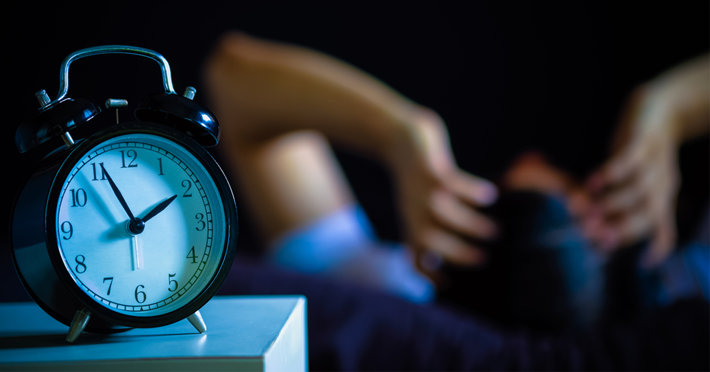How Does Drug Use Effect Sleep?

We all love a good night’s sleep. But more than a third of Americans don’t get it. Somewhere around 30% of us have insomnia. Perhaps 20% of us suffer from sleep apnea. Roughly half of us snore, which might be harder on our mates than ourselves.
Those of us who don’t sleep well either suffer in silence or try one change after another to eliminate the resulting fatigue and grouchiness. What many people never realize is that using illicit drugs could be the primary reason they fail to feel rested after a night under the covers. Unless they drop their drug use out of their daily routines, they may never get the restful sleep they seek.
Cocaine and Other Stimulants
Cocaine is a very strong stimulant, as are methamphetamines and prescription drugs like Ritalin, Adderall, Concerta and Dexedrine. Many synthetic drugs are also stimulants, such as some synthetic cannabinoids and synthetic cathinones, often called “bath salts.”
These stimulants increase the activity of chemicals in the brain, particularly norepinephrine and dopamine. Stimulants may be prescribed medically for a person who is having trouble staying alert. So it stands to reason that they could interfere with a person’s sleep. And they do.
A 1999 study monitored the sleep of cocaine-dependent men as they went through phases of receiving or not receiving doses of cocaine. When they received cocaine, their sleep was “severely disrupted.” When they stopped receiving cocaine, their sleep was no longer severely disrupted, but their daytime sleepiness increased. Two weeks later, their sleep still had not recovered to normal patterns.
Methamphetamine and Cocaine “Binges”
When a person is using cocaine or meth, binges are not unusual. As long as the money holds out, some users will binge on these drugs around the clock. That means they keep stimulating and re-stimulating their bodies, staying up day and night, seldom eating anything because stimulants kill the appetite. Until finally, the body gives out and they crash.
Heavy and long-term use of drugs like cocaine and meth result in sleeping problems, paranoia and hallucinations. There are brain changes that occur after use of these stimulants. When the use of these drugs stops, the brain may not return to normal for a long time, if ever.
The Party Drug Ecstasy

Ecstasy is also known as 4-Methylenedioxymethamphetamine or MDMA. This drug is often taken by people wishing to party or dance all night. It is a strong stimulant that keeps people awake, alert and active.
According to Johns Hopkins Medicine, repeated use of this drug significantly raises the risk of sleep apnea among healthy young people who have no other risk factors for this problem.
Prior to a 2009 study, it was known that ecstasy use was associated with altered brain wave patterns during sleep. For a new study, researchers monitored the sleep patterns of 130 party drug users, some who had taken ecstasy repeatedly and some who had not. The results of this monitoring revealed that the more times ecstasy-using individuals had taken this drug, the more likely it was they would suffer from more serious forms of apnea. Those who had not taken ecstasy showed no increase in rates of apnea.
Use of this drug also creates conditions of hyperarousal for a user, a state in which a person is abnormally alert, as though they are in danger. It is difficult to relax and go to sleep in this state. Ecstasy also damages the ability of a person to reach healing, refreshing REM (rapid eye movement) sleep. Getting enough REM sleep is associated with a stronger immune system, the growth of new, healthy tissues, pain relief, improved concentration while awake, and a better quality of life.
It’s, unfortunately, very easy to find plenty of studies on the damaging effects of ecstasy on sleep. It appears that the evidence on this point is quite clear.
Marijuana
Some people may report that consuming marijuana helps them go to sleep, but any benefit wears off when consumption becomes chronic. Both chronic use and withdrawal from cannabis are associated with negative effects on sleep. The most common problems reported include:
- Strange dreams
- Insomnia
- Poor sleep quality
Once the benefit wears off, an attempt to achieve sleep improvements can drive a person to use increasing amounts of this drug.
Sleep difficulties can continue for as long as six weeks after discontinuing use. One study noted that it can take six months for sleep to return to normal. Worsening sleep problems when a person is trying to quit using marijuana can be a factor in their relapse.
Opioids and Your Sleep
The American Academy of Sleep Medicine (AASM) states:
“…chronic opioid therapy can alter sleep architecture and sleep quality as well as contribute to daytime sleepiness…Opioids are associated with several types of sleep-disordered breathing, including sleep-related hypoventilation,” ... and sleep apnea.”
Sleep architecture: The structure of your sleep. In other words, how deeply are you sleeping, are you dreaming, and so on. It is normal to pass through a number of changes during the night. If this pattern is artificially changed, you may not feel as rested as you should when you wake up. You may feel sleepy during the day or even fall asleep when inactive.
Hypoventilation: Abnormally slow breathing resulting in low levels of oxygen in the blood.

The AASM is talking about a person receiving opioids therapeutically for pain. These effects are just as true for a person using illicitly-obtained opioids, and, in fact, the effects may be more pronounced. A person using opioids they obtain illicitly is unlikely to be controlling their dosages as closely as a person using this type of drug when prescribed by a physician. Their adverse effects may be more pronounced.
Methadone
A study of opioid addicted-individuals in Taiwan revealed that those being administered methadone as part of a treatment program rated their sleep as poor and that the difficulty sleeping increased with higher dosages of methadone.
Morphine and Heroin
One of the stated side effects of morphine is insomnia and strange dreams. A 1981 study found that heroin creates much the same effects on a person trying to sleep, including:
- Wakefulness
- Drowsiness episodes when not trying to sleep
- Abnormal shifts in sleeping patterns
Prescription Painkillers
The situation is no better when a person is misusing pharmaceutical pain relievers. Indeed, even those who are using pain relievers properly can suffer damage to their sleep patterns.
In 2014, twenty-four people who were on long-term opioid painkillers were assessed to determine how well they breathed during sleep and how alert and responsive they were during the day. It has long been known that opioids depress the respiratory function, which is how an overdose kills the user—they stop breathing. Nearly half suffered from severe sleep apnea and responded poorly to tests of alertness during the day. Half of them also showed evidence of being in chronic respiratory failure.

Will You Start Sleeping Better if You Stop Using Drugs?
Possibly but there are no guarantees. One study tracking the sleep of individuals who had just begun to abstain from cocaine use found that their sleep actually worsened early in abstinence but then began to improve by the three-week mark.
Therefore, with some drugs, getting through withdrawal will help a person return to a normal sleep pattern. But as we have seen, it can take months for some drug users to restore their restful sleep.
The science is copious and very clear! The very best thing to do is refrain from starting to abuse drugs! The next best is to stop abusing them as soon as possible and work with a competent physician to gradually heal your brain and nervous system until restful, healing sleep is possible once again.
Sources:
- https://www.cdc.gov/media/releases/2016/p0215-enough-sleep.html
- https://www.sleepadvisor.org/sleep-statistics/
- https://www.sleepfoundation.org/how-sleep-works/sleep-facts-statistics
- https://aasm.org/advocacy/position-statements/chronic-opioid-therapy-position-statement/
- https://www.rxlist.com/ms-contin-side-effects-drug-center.htm
- https://pubmed.ncbi.nlm.nih.gov/7213520/
- https://www.sciencedirect.com/science/article/abs/pii/S0376871613004754?via%3Dihub
- https://archives.drugabuse.gov/testimonies/2013/dangerous-synthetic-drugs
- https://pubmed.ncbi.nlm.nih.gov/10609968/
- https://www.drugabuse.gov/publications/drugfacts/methamphetamine
- https://www.hopkinsmedicine.org/news/media/releases/ecstasy_use_may_lead_to_sleep_apnea
- https://www.ncbi.nlm.nih.gov/pmc/articles/PMC2768958/
- https://www.thensf.org/what-is-rem-sleep/
- https://ascpjournal.biomedcentral.com/articles/10.1186/s13722-016-0056-7
- https://pubmed.ncbi.nlm.nih.gov/25126029/
- https://www.ncbi.nlm.nih.gov/pmc/articles/PMC2442418/
- https://www.frontiersin.org/articles/10.3389/fnmol.2020.00125/full
- https://onlinelibrary.wiley.com/doi/abs/10.1111/j.1601-5215.2011.00628.x


 ®
®